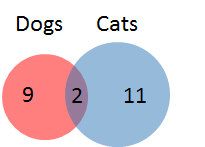All ISEE Upper Level Math Resources
Example Questions
Example Question #1 : Data Analysis And Probability

Refer to the above Venn diagram.
Define universal set 
Define sets 

Which of the following numbers is an element of the set represented by the gray area in the diagram?
The gray area represents the set of all elements that are in 



104 is the correct choice.
Example Question #1 : How To Use A Venn Diagram

In the above Venn diagram, the universal set is defined as 
What is 








Example Question #3 : Data Analysis

In the above Venn diagram, the universal set is defined as 

















Example Question #3 : Data Analysis

In the above Venn diagram, the universal set is defined as 














Example Question #2 : How To Use A Venn Diagram
The following Venn diagram depicts the number of students who play hockey, football, and baseball. How many students play football and baseball?

The number of students who play football or baseball can by finding the summer of the number of students who play football alone, baseball alone, baseball and football, and all three sports.
Example Question #2 : Data Analysis And Probability
A class of 

First, calculate the number of students with a dog:
Next, subtract the number of students with a dog from the total number of students.
Example Question #3 : Data Analysis And Probability
If a standard die is rolled, what is the probability of getting a 1 or a 2?
We need to know the total number of possibilities, and the total number of ways to achieve our goal.
A standard die has 6 faces, so there are a total of 6 numbers that we could roll.
We want to roll a 1 or a 2, which means there are 2 ways that we can succeed (rolling a 1 or a 2).
Thus, we have a probability of success as 

Example Question #4 : Data Analysis And Probability
The beverage menu from a restaurant reads as follows:
Ten friends go out for drinks. They order four sodas, two coffees, two iced teas, a milk, and a hot tea. One of the ten agrees to leave the entire amount of the tip, which is to be 20% of the check. What is the amount of the tip (round to the nearest dime)?
The costs of the beverages will be as follows:
Add these amounts:
20% of $14.40 is 
Example Question #1 : Data Analysis And Probability

Refer to the above graph, which shows the high temperatures in the town of Smithville over seven days.
On how many days that week did Smithville see a peak temperature 75 degrees or greater?
There were four days that saw a peak temperature of 75 degrees or greater:
Monday: 76 degrees
Tuesday: 80 degrees
Wednesday: 77 degrees
Friday: 78 degrees
Example Question #1 : Tables

Refer to the above graph, which shows the high temperatures in the town of Smithville over seven days.
Which day of this week saw the highest peak temperature?
Monday
Thursday
Tuesday
Wednesday
Friday
Tuesday
The highest point on the line graph is located at Tuesday.
All ISEE Upper Level Math Resources






















































